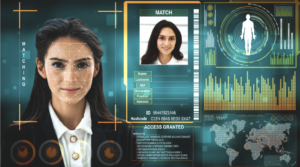Facial recognition has emerged as an innovative technology that is transforming diverse areas, from security to marketing. Today, this technology has become ubiquitous, found in mobile devices, security systems and enterprise applications. But what exactly is facial recognition and why is it so important for businesses?
What is facial recognition?
Facial recognition is a biometric technology that identifies and verifies people by analyzing their unique facial characteristics. This is achieved through algorithms that can recognize specific patterns in an image or video, such as the distance between the eyes, the shape of the nose and the structure of the jaw.

Current applications of facial recognition
- Security: One of the most common applications of facial recognition is in security systems. From unlocking a smartphone to accessing high-security facilities, this technology ensures fast and accurate identification.
- Marketing and Customer Experience: In business, facial recognition is used to improve the customer experience. By analyzing facial expressions, companies can gain valuable insights into their customers’ emotions, allowing them to tailor their products and services more effectively.
- Attendance Control and Human Resources: In the labor sector, facial recognition is used for attendance control and human resources management. This facilitates the recording of hours worked, employee identification and security in the workplace.
- Service Personalization: By recognizing customers, companies can personalize their services according to individual preferences. This applies in sectors such as hospitality, where a more personalized service can be offered based on a customer’s visit history.

Importance of facial recognition for businesses
- Improved Security: The use of facial recognition in enterprises improves security by restricting unauthorized access to sensitive facilities and data.
- Operational Efficiency: Facilitates human resource management by automating processes such as attendance control, which saves time and reduces errors.
- Improved Customer Experience: By understanding customer emotions, companies can adapt their marketing strategies and improve customer satisfaction.
- Personalization and Loyalty: Enabling personalized customer experiences, which fosters loyalty and retention.

In short, facial recognition is a powerful technology that is changing the way businesses operate and engage with their customers and employees. Its impact on security, operational efficiency and customer experience makes it an invaluable tool in the modern business world.




